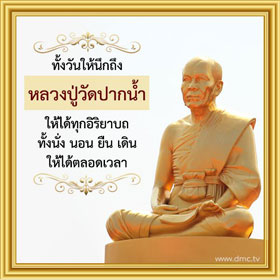Question:
Venerable Luang Por, Sir, in the case where the judge sentences the murderer to death, but does not execute the culprit him/herself, is s/he regarded as violating the first precept him/herself?
Answer
by Venerable Dhattajeevo Bhikku
In the matter of punishment by law, first of all you should understand there is constitutional law and subordinate law. The subordinate law is dependent on the constitutional law. For example; if judged by the subordinate law, and the accused is found guilty, but the constitutional law says s/he is innocent, then s/he will be exonerated from the accusation.
However, the guilt in terms of the precepts is based on the law of karma. Don’t mix them up. Once one is jumbled up about the worldly law and the karmic law, s/he is unable to make a righteous judgment.
The worldly law was created by human beings and is used to settle disagreements that occasionally occur. And often it is applied to the same kinds of cases but different verdicts are brought in. In terms of the law of karma with regards to the issue of killing, no matter of where or when, one is always guilty. The karmic law is universal, and does not belong to any country.
Likewise, the sun shines for Chinese people, Thai people, western people and all others in the world regardless of nationality and religion. The worlds’ citizens are sharing the light and the heat from it.
In the case of sentencing the criminal to death, from the view of the state law, the judge is not wrong because the state authorizes him/her to do so. Anyway, killing is always wrong in the face of the law of karma.
The constituents of killing are comprised of 5 respective steps, namely:
1) The being is alive.
2) Knowing the being is alive.
3) One harbors the intention to kill.
4) Executing the being.
5) The being dies.
Whenever one receives an instruction to kill and the order is carried out, anybody who is in charge of any steps in the process will definitely undergo the woe that is due proportionally thereafter. However, there is a mitigating circumstance as I have mentioned previously by not being content with the order.
And secondly the villain who receives the death sentence realizes his/her immoral conduct and admits his/her guilt as well as not entering into a feud with the judge. The judgment is even vicious but the degree of karma is less.
But if it happens that the culprit is indeed wrong but s/he refuses to admit the truth and engages in rebuttal with the judge, then the feud will continue endlessly into the cycle of existence.
Especially in the case where the judge issues a wrong verdict when the evidence obviously proves the accused guilty but s/he in fact is innocent, the retribution in this sort of case is severe.
I would like to tell the police, the military men and women and those in the justice system that they should not mix up worldly law with karmic law. In the face of the law of karma, wrong is always wrong. It is dependent on merit and karma.
It is different from worldly law, which is created by the agreement of a group of legislators, so you must be careful.
I also would like to append that the duty of the police, and military men and women, and those in the justice system who handle all the problems at this stage are too late because the criminals have already committed their harmful acts. The justice sits on the bench to adjudicate the charges after the crime has been committed; then s/he condemns another to death, causing the killing of an additional person. Whatever the worldly law is regarding this account, I will not get involved in but I would like to say now that we make decisions at the end of the source (in the wrong direction) instead of the beginning.
In the beginning, the police, the military men and women and those in the justice system should get together to think of how they should get the Lord Buddha’s Dhamma into peoples’ hearts. Unfortunately, it may not be seen as their duty to do so.
As a matter of fact it is the responsibility of everyone in the nation to give his or her ideas to settle certain measures and help subside problems in preventive ways rather than corrective ways so that:
1) Execution is the last resort and a minimum of criminals is subjected to it.
2) Or perhaps the courts can show clemency towards the criminals by resorting to a life sentence in prison.
Why? This is because no one has the right to destroy the life of others because we are not the ones who give or create life. In conclusion, killing for any reason is always wrong and will create a circle of vengeance without an end.
Furthermore, after committing the first murder, then the second, and the third will come. Why? This is because we have not yet corrected the mischievous traits of the younger generation, so the criminal conduct is never ending.
I would also like to add a bit more, stating that the legislators who pass the bills to allow the death sentence will receive karmic retribution besides. When any judge issues each successive death sentence thereafter, the legislators who are already reborn in the hell realm will continue to have their karma still multiply, causing them to be pulled further down the abyss and will be subjected to that lower realm for even longer.
So if anyone wants to issue a death sentence or wants to execute others, they should very carefully scrutinize this because no one can rightly kill any- one, for s/he is not the creator of life.

http://goo.gl/zs8jc








 พิมพ์บทความนี้
พิมพ์บทความนี้




























